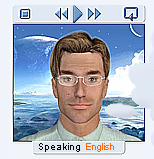Paco visits Scotland and Wales: Approaching Scotland
Introduction
This unit deals with another verb tense: the present perfect (simple and continuous), together with some words which frequently appear with this tense: for, since, ever, still, already , yet and just. Although you will realize that the uses of the present perfect are not equivalent in Spanish, don't worry, you will learn it easily.
Also in this unit, you are going to learn some verbs which are followed by the infinitive with "to", and the plural of nouns in English, with some irregular plurals.
Concerning vocabulary, you will learn words related to literature and the cinema, as well as certain common noun suffixes in English.
In topic 1, the main objective is to be able to identify and recognise all these forms, and in subsequent topics you will learn more about them. Let's begin!
As you know, Paco has had a great time in London. He has visited a lot of interesting places and now is ready for his next adventure: Scotland, where he is meeting new people. Our friend has already left England on the train and, during the journey, he has been reading some leaflets about Edinburgh, the capital city of Scotland, and the Highlands, the very north of the country. He has been willing to see Loch Ness since he read Sonia's book of legends and now he is planning to go there as well. Have you ever been to Scotland? Have you heard about the Loch Ness Monster? You'll find out more soon in this unit.
Can you identify one example of....?
 |
| By urbisnauta, C. Commons |
- Present perfect simple.
- Present perfect continuous.
- An example of "already".
- An example of "ever".
- Verb followed by infinitive with "to".
- Plural nouns.
- An irregular plural.
If you want to know how to pronounce certain words, phrases or sentences, or you would like to practice your English, write something down and Mike will read it to you.
Remember you can use it any time!

|
| Click here to use Mike. |